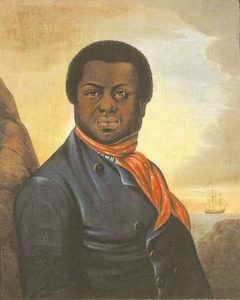
Paul Cuffee
*Paul Cuffee was born on this date in 1759. He was a Black philanthropist, merchant, sea captain, and abolitionist.
The son of a former African slave father and Native American (Wampanoag and Ashanti) mother, Cuffe was born on the island of Cuttyhunk, Massachusetts, near the commercial port of New Bedford. Later, he was persuaded "that commerce furnished to industry more ample rewards than agriculture," and he prepared himself for that field by becoming proficient in mathematics and navigation. Opposed to discrimination against his people, Cuffee championed their cause with an intensity that might be expected of a less successful man. But his wealth was no shield against racism, and his problems reveal as much about its long arm as about the difficulties encountered by a Black person in America.
A nationalist and Quaker, he was shaped by the significant issues of his era. His people's concerns did not define his interests alone, but they were at the center of his life and accounted for much of his influence. Through his efforts, Blacks were granted the right to vote in Massachusetts in 1783. Most of Cuffe's life was spent in Westport, a Quaker enclave in southwestern Massachusetts, where he bought a farm for $3500 in 1797.
He earned his fortune from whaling and trade in the Americas and Europe. Over time, he owned shares in up to ten ships, and the financial support of the Friends and their doctrine figured in his success as a businessman. They captained some of his ships and, like him, believed that the virtues of the counting-house, such as industry and frugality, were pleasing in the sight of God.
Cuffee's faith was a factor in using a substantial portion of his wealth to help others, building a school when the community failed to do so, and contributing to raising a new Friends meetinghouse in Westport. Cuffee's interest in Africa stemmed partly from his father's birth there. Cuffee promoted colonization in Sierra Leone and took a group of thirty-eight black settlers there in 1811. His success as a Black captain with Black crews was evidence of the black expertise essential to Africa's redemption.
His voyage there was on his ship in 1815 with emigrants from America, and his financial success anticipated ideals later associated with Black nationalists from Henry Highland Garnet to Marcus Garvey. Like Bishop Henry M. Turner later in the century, this complex man was confident of his vision of risking being associated with the American Colonization Society. Their motives regarding the return of Blacks to Africa were highly suspect in Black leadership circles.
Though working to uplift his people, Cuffee accepted support from white allies and, though struggling for Black rights in America, assisted in the regeneration of Africa. He made an impact during his life sufficient to begin a tradition, perhaps his most incredible legacy.
Cuffee died on September 7, 1817, and many people attended his funeral in Westport. Paul Cuffe was buried in the Friends cemetery there.
The African American Atlas
Black History & Culture an Illustrated Reference
by Molefi K. Asanta and Mark T. Mattson
Macmillan USA, Simon & Schuster, New York
ISBN 0-02-864984-2